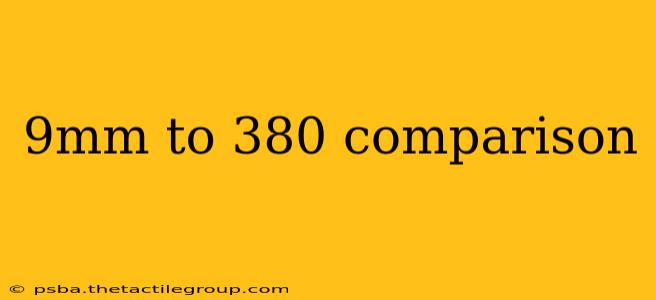Choosing the right caliber for self-defense or concealed carry is a critical decision. Two popular choices often debated are the 9mm Parabellum (9x19mm) and the .380 ACP (9x17mm). This in-depth comparison will explore the key differences between these cartridges, helping you make an informed choice based on your individual needs and capabilities.
Ballistics: Power and Penetration
The most significant difference between the 9mm and .380 ACP lies in their ballistic performance. The 9mm boasts significantly more stopping power due to its larger projectile and higher velocity.
9mm Parabellum Advantages:
- Greater Stopping Power: The 9mm's larger bullet diameter and higher velocity deliver substantially more kinetic energy upon impact, increasing the likelihood of incapacitating a threat.
- Increased Penetration: While penetration depth isn't always desirable (over-penetration can be dangerous), the 9mm generally penetrates deeper than the .380 ACP, ensuring effective stopping power even through barriers like clothing or light cover.
- Wider Availability of Ammunition: 9mm ammunition is more readily available and often cheaper than .380 ACP, offering greater accessibility for practice and self-defense purposes.
.380 ACP Advantages (Relatively Speaking):
- Reduced Recoil: The .380 ACP's smaller size and lower recoil make it easier to shoot accurately, especially for those with smaller hands or less shooting experience. This can be a considerable advantage for new shooters or individuals with limited upper body strength.
- Smaller Size and Weight: This translates to smaller and lighter firearms, making them more comfortable for concealed carry.
Recoil and Shootability
As mentioned above, recoil is a key factor to consider.
- 9mm Recoil: While manageable for most shooters, the 9mm's recoil can be more pronounced, potentially impacting accuracy, especially during rapid fire.
- .380 ACP Recoil: The .380 ACP's significantly lighter recoil makes it more comfortable to shoot repeatedly, leading to better accuracy and faster follow-up shots. This is especially beneficial for smaller-statured individuals or those new to firearms.
Concealability and Carry
The size and weight of the firearm are crucial for concealed carry.
- 9mm Handguns: While 9mm handguns are available in compact sizes, they are generally larger and heavier than their .380 ACP counterparts.
- .380 ACP Handguns: These are typically smaller and lighter, making them more easily concealable in various carry methods (pocket carry, ankle carry, etc.).
Ammunition Costs and Availability
Ammunition costs and availability are important long-term considerations.
- 9mm Ammunition: Generally more widely available and usually less expensive than .380 ACP ammunition.
- .380 ACP Ammunition: Can be more expensive and sometimes harder to find, especially in certain regions or during periods of high demand.
Conclusion: Which Caliber Is Right for You?
The best caliber depends on your individual needs and capabilities.
-
Choose 9mm if: You prioritize stopping power, have some shooting experience, and can handle moderate recoil. The wider availability and lower cost of ammunition are also significant advantages.
-
Choose .380 ACP if: You prioritize ease of shooting, concealability, and reduced recoil. This is often a better choice for first-time gun owners, smaller individuals, or those who require maximum concealability.
Ultimately, the decision rests on your personal assessment of the trade-offs. Consider your shooting experience, physical capabilities, and intended use for the firearm. It's also strongly recommended to try both calibers at a shooting range before making a final decision. Remember, responsible gun ownership includes proper training and safe handling practices.

